Input dealers, trained under the DAESI programme by MANAGE, has played a key role in providing advisory and marketing support to farmers during the COVID-19 lockdown. Here, Vincent A and Balasubramani N talk of the roles played by input dealers in Karnataka during this challenging period.
CONTEXT
The COVID-19 crisis impacted the food security and livelihoods of millions of farmers worldwide. Extension and Advisory Services (EAS) have been playing a major role in supporting farmers in addressing the challenges. While most reports discussed in detail the extension services carried out by public extension during the COVID-19 crisis and lockdown, there is very little reference to the role input dealers (who are an important source of information for farmers in India and elsewhere) played during this crisis in supporting farmers. Given this, an attempt was made to understand the contributions of input dealers who were trained under the Diploma in Agricultural Extension Services for Input Dealers (DAESI) programme in Karnataka (Box 1).
To understand the extent of involvement of these dealers in providing EAS, as well as to learn from their experiences, a study was conducted in March 2020, among 120 DAESI trained input dealers of Karnataka State.
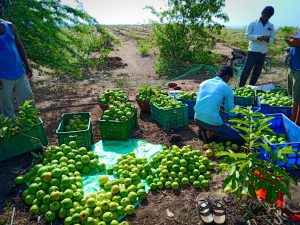
Mr N agaraj Chamaraj, Hukkeri, Belgavi district sells Guava to local buyer
| Box 1. DAESI
The Diploma in Agricultural Extension Services for Input Dealers (DAESI) was conceptualised by MANAGE during 2002-03 as a one-year diploma programme to train input dealers on scientific agriculture, and develop them as para extension professionals. Since then, this course has been implemented by the National Institute of Agricultural Extension Management (MANAGE) and State Agricultural Management and Extension Training Institute (SAMETI) at national and state levels, respectively. Various Nodal Training Institutes (NTIs), such as Agricultural Technology Management Agency (ATMA), Krishi Vigyan Kendras (KVKs), Farmers Training Centre (FTC), NGOs etc., are implementing the DAESI programme across India. Since 2002-03 a total of 28,313 input dealers have been trained until February 2020. |
Though the dealers are providing various extension services to farmers, the study has focused mostly on their extension roles that directly refer to the problems faced by farmers during the lockdown. For example, the study has analysed the dealers’ field visits, their marketing interventions to save farmers from distress sales, and the use of ICTs to provide solutions to farmers that address the present farm crisis.
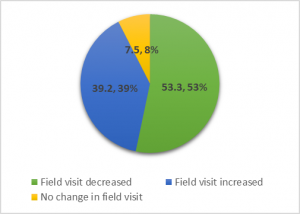 Fig. 1: Field visits of input dealers during the lockdown
Fig. 1: Field visits of input dealers during the lockdown
About 39% of the dealers said that they have managed to visit farmers’ fields even during the lockdown. Interestingly, their visits to fields have increased during the lockdown. The dealers who have visited farmers’ fields indicated that they have provided advisories on various good practices of agriculture, such as rate of fertiliser application, management of pest and diseases, assessing the quality of farm produce, direct marketing of produce, organising farmers’ collective, etc. Around 53% of them stated that visits to farmers’ fields have decreased during the lockdown. The major reason for the decrease in field visits is that the timing of their shops coincided with the timing of their field visits that is, mostly early morning to noon or late noon.
SERVICES PROVIDED BY INPUT DEALERS DURING THE LOCKDOWN
Extension and soil management
 Mr Anil Kumar, an input dealer from Kalaburagi district, indicated that he has visited his farmers’ fields and provided advisory services on the procedure for soil sampling and application of fertiliser based on soil sample test results. He also spoke to them about the soil testing facilities at KVK Kalaburagi. He realised that this summer was the best time for advising farmers on the importance of soil testing since most of the farmers had left their lands fallow due to the lockdown, which therefore might help them get a good yield in the monsoon season. Up until the end of April he had advised about 50 farmers since the start of the lockdown period.
Mr Anil Kumar, an input dealer from Kalaburagi district, indicated that he has visited his farmers’ fields and provided advisory services on the procedure for soil sampling and application of fertiliser based on soil sample test results. He also spoke to them about the soil testing facilities at KVK Kalaburagi. He realised that this summer was the best time for advising farmers on the importance of soil testing since most of the farmers had left their lands fallow due to the lockdown, which therefore might help them get a good yield in the monsoon season. Up until the end of April he had advised about 50 farmers since the start of the lockdown period.
Advisory on pest management
 Mr Narayan Kotriki, an input dealer from Chincholi, Kalaburagi district, has visited about 50-60 farmers who were growing watermelon that were found to have infestations of leaf burning disease. He advised them to mix 2 g Ridomil gold in one litre of water and spray it in the evening time for effective control of the disease. He mentioned that he has been advising farmers about crop management. He further stated that farm advisory is more important, especially during a crisis time like this, as it helps farmers to build trust in input dealers, for more than crop management. He also said that the scientists of KVK, Kalaburagi, have become his major point of contact after the DAESI programme. During the lockdown, his contacts with scientists have become even more significant since their advisory has helped him to address the immediate needs of farmers, such as marketing, transportation, etc.
Mr Narayan Kotriki, an input dealer from Chincholi, Kalaburagi district, has visited about 50-60 farmers who were growing watermelon that were found to have infestations of leaf burning disease. He advised them to mix 2 g Ridomil gold in one litre of water and spray it in the evening time for effective control of the disease. He mentioned that he has been advising farmers about crop management. He further stated that farm advisory is more important, especially during a crisis time like this, as it helps farmers to build trust in input dealers, for more than crop management. He also said that the scientists of KVK, Kalaburagi, have become his major point of contact after the DAESI programme. During the lockdown, his contacts with scientists have become even more significant since their advisory has helped him to address the immediate needs of farmers, such as marketing, transportation, etc.
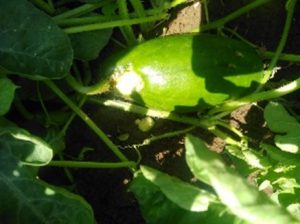 Burning disease on watermelon
Burning disease on watermelon
Networking is key
 Mr Mohan Kumar DR, is an input dealer who has his shop at Doddaballapur, Bangalore Rural. As most of his farmers reported non-availability of transport facilities to go for input purchase, he arranged his brother’s Tata Ace for the transport of inputs directly to farmers’ doorsteps. He made an inventory of the inputs required by his customers twice every week. After preparing the inventory, he had arranged a vehicle from his brother and supplied the inputs required directly to four to five farmers every day during lockdown phases 1.0 and 2.0. He stated that this initiative has minimised the transport charge of each farmer to just Rs. 10 per bag. Previously, the same farmers had to spend about Rs. 50-100 per bag for transport alone. The most significant part of his services is that he advised his farmers to pay the amount online using Phonepe or GPay.
Mr Mohan Kumar DR, is an input dealer who has his shop at Doddaballapur, Bangalore Rural. As most of his farmers reported non-availability of transport facilities to go for input purchase, he arranged his brother’s Tata Ace for the transport of inputs directly to farmers’ doorsteps. He made an inventory of the inputs required by his customers twice every week. After preparing the inventory, he had arranged a vehicle from his brother and supplied the inputs required directly to four to five farmers every day during lockdown phases 1.0 and 2.0. He stated that this initiative has minimised the transport charge of each farmer to just Rs. 10 per bag. Previously, the same farmers had to spend about Rs. 50-100 per bag for transport alone. The most significant part of his services is that he advised his farmers to pay the amount online using Phonepe or GPay.
It is interesting to note from the above that the dealers have played a significant role in meeting the needs of farmers during the COVID-19 pandemic. What is mentioned above are only a few examples of what the dealers are contributing to the farmers’ welfare through their extension services. There are many more such happenings in the fields, yet many of them go unnoticed.
MARKETING INTERVENTIONS OF THE INPUT DEALERS
The most devastating problem faced by farmers during the lockdown is low price. As the transport of goods and services was suspended, the intra and inter districts transport have become a major issue, let alone the interstate movement of vehicles. This is followed by the non-availability of traders and buyers which has further aggravated the marketing problems. Thus, the farmers were forced to sell their produce at throwaway prices. Many of the government organisations, such as Agricultural Produce Marketing Committee (APMC), Farmers Producers Company, Krishi Vigyan Kendra (KVK), etc., have intervened and tried to facilitate marketing the produce at better farm gate prices. Similarly, input dealers have made efforts to link their farmers with various marketing institutions, thereby helping them to realise a better price.
The study is also revealing that more than half of the input dealers (58%) have linked their farmers with local buyers. Nearly half of the input dealers (50%) have pointed out that they have linked their farmers with the Agricultural Produce Marketing Committee (APMC), and they have provided the contact details of the nearby APMC markets. Similarly, one-fourth (25%) of them have linked their farmers with KVKs and nearly one-fifth (23.3%) have facilitated a marketing arrangement with Farmer Producer Companies (FPC). A few examples of input dealers’ marketing interventions are given below.
Direct procurement
 Mr Raghunatha Reddy, an input dealer from Gauribidanur, Chikkaballapur district has directly procured vegetables from 15 of his farmers. He offered a relatively higher price to the farmers. He purchased tomato @ Rs. 4.5/kg, brinjal @ Rs. 8/kg, and onion @ Rs. 14/kg. In total, he bought around 4.5 tonnes of vegetables and distributed them freely to the needy people of Gauribidanur Taluk.
Mr Raghunatha Reddy, an input dealer from Gauribidanur, Chikkaballapur district has directly procured vegetables from 15 of his farmers. He offered a relatively higher price to the farmers. He purchased tomato @ Rs. 4.5/kg, brinjal @ Rs. 8/kg, and onion @ Rs. 14/kg. In total, he bought around 4.5 tonnes of vegetables and distributed them freely to the needy people of Gauribidanur Taluk.
 In a similar case, Mr Sumukh DM, a young input dealer from V V Puram, Bangalore, bought about a half ton of mangoes from his customers. When the lockdown was announced, two of his customers who grow Alphonso and Rajapuri varieties of mango approached him to buy their mangoes, for a lower price as these two farmers were forced to sell their mangoes @Rs. 20 per kg at the local markets. Mr Sumukh after contacting all of his relatives and friends bought a half ton of mangoes at the actual price i.e., Rs. 400 for 3 kg of Alphonso and Rs. 350 for 3 kg of Rajapuri. He noted that these two farmers were his best customers and he did not want to give them a trivial price for their hard-earned mangoes.
In a similar case, Mr Sumukh DM, a young input dealer from V V Puram, Bangalore, bought about a half ton of mangoes from his customers. When the lockdown was announced, two of his customers who grow Alphonso and Rajapuri varieties of mango approached him to buy their mangoes, for a lower price as these two farmers were forced to sell their mangoes @Rs. 20 per kg at the local markets. Mr Sumukh after contacting all of his relatives and friends bought a half ton of mangoes at the actual price i.e., Rs. 400 for 3 kg of Alphonso and Rs. 350 for 3 kg of Rajapuri. He noted that these two farmers were his best customers and he did not want to give them a trivial price for their hard-earned mangoes.
Linking farmers with the potential buyer
 A farmer of Chitradurga district, Mr Rajashekhara Reddy P, complained about the low price for their pomegranates as there were inadequate buyers and poor transport due to the lockdown. Hence, he visited their fields and organised them into a small farmers’ collective. Further, he identified a potential buyer who promised to buy pomegranate @ Rs.40-50/kg, which was Rs. 10 higher than the price offered by the local buyers. This way, he procured about 400 tons of pomegranate from his farmers and helped them to realise a better price for their produce even during the lockdown. All the 10 farmers have thus gained a profit of Rs. 10-15 per kg of pomegranate by selling it @ Rs.40-50/kg on different days, which would otherwise have been sold @ Rs. 30-35/kg to the local traders.
A farmer of Chitradurga district, Mr Rajashekhara Reddy P, complained about the low price for their pomegranates as there were inadequate buyers and poor transport due to the lockdown. Hence, he visited their fields and organised them into a small farmers’ collective. Further, he identified a potential buyer who promised to buy pomegranate @ Rs.40-50/kg, which was Rs. 10 higher than the price offered by the local buyers. This way, he procured about 400 tons of pomegranate from his farmers and helped them to realise a better price for their produce even during the lockdown. All the 10 farmers have thus gained a profit of Rs. 10-15 per kg of pomegranate by selling it @ Rs.40-50/kg on different days, which would otherwise have been sold @ Rs. 30-35/kg to the local traders.
Linking farmers with supermarkets
 Mr AV Badrish has his input shop at Doddaballapur, Bangalore Rural, a city which is 40 km away from Bangalore city. As marketing has become a serious problem due to the lockdown, most of his farmers contacted him to facilitate marketing of their vegetables. Though having no options, he wanted to help these farmers. Moreover, they are his regular customers. Thus, he took an initiative to link his vegetable growers to Reliance Fresh, Ninjacart (https://ninjacart.in/), and Big Basket. With the help of contract farmers of these supermarkets, he linked about 30 farmers to these supermarkets. All the three supermarkets agreed to buy vegetables from these new farmers although they were not their regular contract farmers. Once in two or three days, these farmers sell about 500 to 600 kg of vegetables to the agents of supermarkets at their designated outlets. He said that the farmers get a fair price on their produce. For example, farmers gained about Rs. 8-10 per kg for tomato; Rs. 14-15 per kg for cucumber, Rs. 30-35 for ridge gourd, Rs.30-35 and Rs. 20-25 for bhendi, and a considerable price for cabbage and cauliflower.
Mr AV Badrish has his input shop at Doddaballapur, Bangalore Rural, a city which is 40 km away from Bangalore city. As marketing has become a serious problem due to the lockdown, most of his farmers contacted him to facilitate marketing of their vegetables. Though having no options, he wanted to help these farmers. Moreover, they are his regular customers. Thus, he took an initiative to link his vegetable growers to Reliance Fresh, Ninjacart (https://ninjacart.in/), and Big Basket. With the help of contract farmers of these supermarkets, he linked about 30 farmers to these supermarkets. All the three supermarkets agreed to buy vegetables from these new farmers although they were not their regular contract farmers. Once in two or three days, these farmers sell about 500 to 600 kg of vegetables to the agents of supermarkets at their designated outlets. He said that the farmers get a fair price on their produce. For example, farmers gained about Rs. 8-10 per kg for tomato; Rs. 14-15 per kg for cucumber, Rs. 30-35 for ridge gourd, Rs.30-35 and Rs. 20-25 for bhendi, and a considerable price for cabbage and cauliflower.
UNLOCKING THE POTENTIAL OF ICT DURING THE LOCKDOWN
Another interesting episode from this lockdown is the increase in the use of ICTs. More than half of the dealers (52%) have indicated that they have received more phone calls from their farmers during the lockdown compared to before the lockdown, so is the case with WhatsApp messages. The dealers have recommended several good practices through WhatsApp messages, which include delivery of daily market price to their customers through WhatsApp group, sharing the Mobile Apps related to crop production such as IFFCO Kisan and Apni kheti and other crop production technologies.
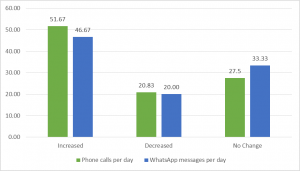
Fig. 2: Increasing trends in mobile communication during the lockdown compared to before lockdown
It is also evident from the results that most of the input dealers (72.5%) confirmed that the farmers have started ordering their required inputs over phone calls during the lockdown. Of them, nearly, 37% have door delivered the inputs ordered by their farmers. It was possible because nearly half of the input dealers have obtained special permission as well as vehicle passes from the Department of Agriculture for transporting essential goods such as inputs, which helped them to deliver these inputs to farmers even during the lockdown.
| “I have sent the daily market price of various commodities to my farmers through WhatsApp group for selling at the right price during the lockdown” Swamy BT, an input dealer from Doddabalapur, Bangalore Rural. |
CONCLUSIONS
Overall, the study reveals that the input dealers have played a significant role in safeguarding farmers from the lockdown distress to a certain extent. Though the lockdown has affected input dealers’ business and extension advisory services, the dealers have tried their best to gain the farmers’ trust and to cater to the needs of farmers during this COVID-19 pandemic. It is high time that the government extension system leverages the capacity of input dealers (who are also one of the most important sources of information for Indian farmers) during the crisis and thereafter as well.
 Mr Vincent A, Consultant, Centre for Climate Change and Adaptation (CCA). (Email: daesi-consultant1@manage.gov.in)
Mr Vincent A, Consultant, Centre for Climate Change and Adaptation (CCA). (Email: daesi-consultant1@manage.gov.in)
 Dr N Balasubramani, Director, Centre for Climate Change and Adaptation (CCA), MANAGE.(Email:balasubramani@manage.gov.in)
Dr N Balasubramani, Director, Centre for Climate Change and Adaptation (CCA), MANAGE.(Email:balasubramani@manage.gov.in)



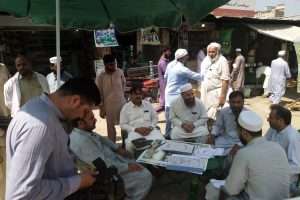

Add Comment